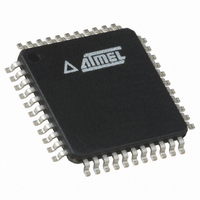ATMEGA162-16AI Atmel, ATMEGA162-16AI Datasheet - Page 10

ATMEGA162-16AI
Manufacturer Part Number
ATMEGA162-16AI
Description
IC MCU AVR 16K 5V 16MHZ 44-TQFP
Manufacturer
Atmel
Series
AVR® ATmegar
Specifications of ATMEGA162-16AI
Core Processor
AVR
Core Size
8-Bit
Speed
16MHz
Connectivity
EBI/EMI, SPI, UART/USART
Peripherals
Brown-out Detect/Reset, POR, PWM, WDT
Number Of I /o
35
Program Memory Size
16KB (8K x 16)
Program Memory Type
FLASH
Eeprom Size
512 x 8
Ram Size
1K x 8
Voltage - Supply (vcc/vdd)
2.7 V ~ 5.5 V
Oscillator Type
Internal
Operating Temperature
-40°C ~ 85°C
Package / Case
44-TQFP, 44-VQFP
Lead Free Status / RoHS Status
Contains lead / RoHS non-compliant
Data Converters
-
Available stocks
Company
Part Number
Manufacturer
Quantity
Price
Company:
Part Number:
ATMEGA162-16AI
Manufacturer:
MIT
Quantity:
170
Part Number:
ATMEGA162-16AI
Manufacturer:
ATMEL
Quantity:
20 000
Notes:
10
0x01 (0x21)
0x00 (0x20)
Address
1. When the OCDEN Fuse is unprogrammed, the OSCCAL Register is always accessed on this address. Refer to the debug-
2. Refer to the USART description for details on how to access UBRRH and UCSRC.
3. For compatibility with future devices, reserved bits should be written to zero if accessed. Reserved I/O memory addresses
4. Some of the Status Flags are cleared by writing a logical one to them. Note that the CBI and SBI instructions will operate on
ATmega162/V
ger specific documentation for details on how to use the OCDR Register.
should never be written.
all bits in the I/O Register, writing a one back into any flag read as set, thus clearing the flag. The CBI and SBI instructions
work with registers 0x00 to 0x1F only.
UCSR1B
UBRR1L
Name
RXCIE1
Bit 7
TXCIE1
Bit 6
UDRIE1
Bit 5
USART1 Baud Rate Register Low Byte
RXEN1
Bit 4
TXEN1
Bit 3
UCSZ12
Bit 2
RXB81
Bit 1
TXB81
Bit 0
2513KS–AVR–07/09
Page
187
190















